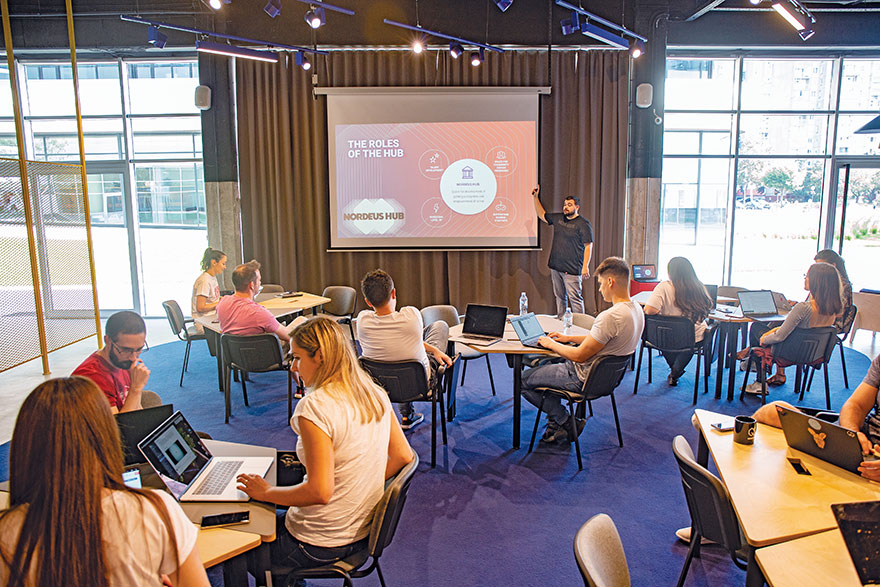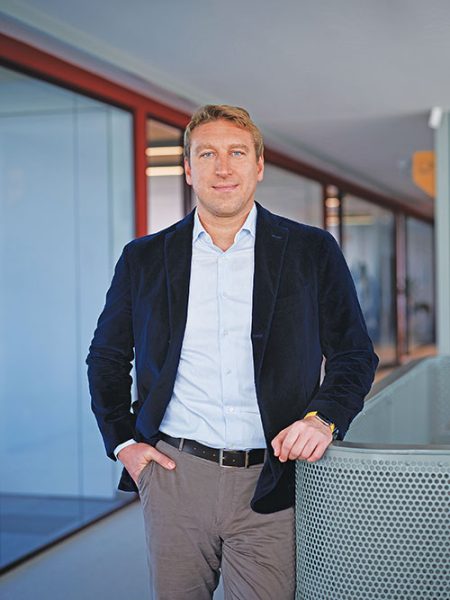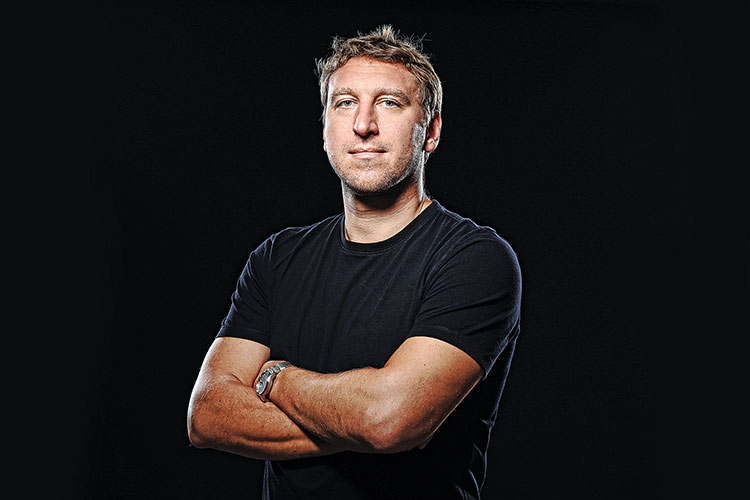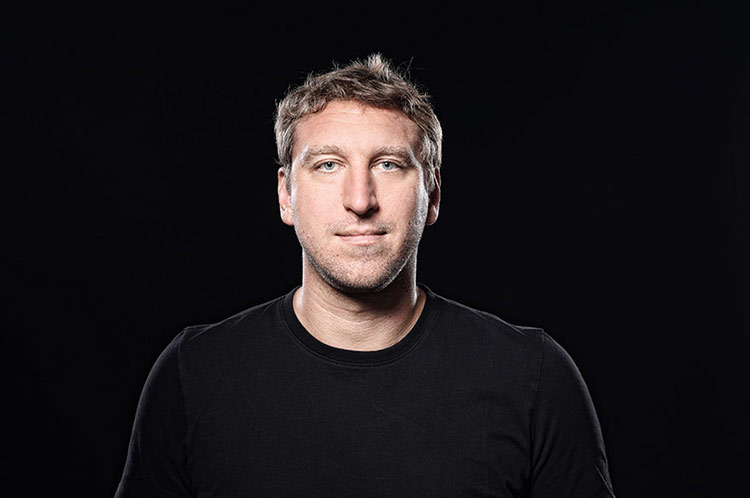With the arrival of Fourth Industrial Revolution, here in Serbia we gained our first ever chance to compete equally on the world market of digital products and services, and to thus create great value, from Serbia to the world. What’s been keeping me awake for a long time is how youngsters can be provided with support even earlier, through education, in order for them to have the best possible chance of success in the digital economy
The future is bright – says Nordeus CEO Branko Milutinović speaking in this interview, which we conducted towards the end of the not overly optimistic year of 2021. But this wasn’t his answer to the question of what the partnership with American company Take Two means for Nordeus, nor what the future of gaming in Serbia will be like following this acquisition. This conversation saw us address a much more important topic: how Serbia can utilise the opportunity of the Fourth Industrial Revolution to fundamentally shift its position on the map of developed countries, relying on talented individuals in both worlds – those of the “newer” and “traditional” economies.
We find ourselves facing two conflicting stories: one suggesting that your decision to sell Nordeus sends a signal to other Serbian gaming companies that this is no longer an area in which it is possible to work miracles from a small country; and the opposite – that gaming is one of the few areas in which it is possible for small teams operating far from Silicon Valley to succeed, precisely because it is not based on expensive industrial equipment and decades of accumulated knowledge. What is the truth of the matter?
The gaming industry is undeniably pulling the entire entertainment industry into the future. Mobile games, where Nordeus competes, generate more revenue than the world’s entire film and music industries combined. And many other digital industries are largely attempting to understand how we succeed in creating such enticing experiences and worlds, which become part of human’s everyday existence. And that’s without mentioning the metaverse, which is very popular today and has already existed in video games for some time and is evolving year-on-year. We should be proud of all the Serbian gaming companies that have placed our country on the global map of one of the most innovative, profitable, but also most competitive industries.
Best testifying to how far we’ve advanced is the fact that two companies that are probably the most successful technology companies founded in Serbia belong to the gaming industry. The future is bright, both because of where the global gaming industry is going and because we’ve built an incredible foundation to keep growing as an ecosystem that feeds itself on tech expertise, artistic expression and creative problem solving – all of which we are very strong at as a nation. Hence this industry presents a serious opportunity for young people from Serbia, but also for our country generally.
How do you see the future and the contribution of this partnership with TakeTwo, in terms of its significance for Nordeus and the community?
TakeTwo is probably the most innovative and creative group of companies in the gaming industry worldwide. We are proud that one team from Serbia has become a partner, working sideby- side with the people behind some of the best games in the world: GTA, Civilization, Bioshock, NBA2K. We feel it as a real partnership, as a symbiosis in which both sides see numerous opportunities for growth. TakeTwo didn’t have football in its portfolio, and it has been recording growth for a long time already. The mobile games segment is also increasingly developing, which represents one of their strategic focuses. With Nordeus, the world’s most successful mobile football game is now part of this company’s further strategic growth.
On the other side, this is a real opportunity for Nordeus to invest more in new products and technologies, hire more top experts, but also provide our young people with the best possible chance to launch their careers alongside world experts, whether they are software engineers, artists, data scientists, designers, marketers or psychologists. With the support of our partners, we have a better chance of penetrating some of the world’s largest and challenging markets, such as that of China.

I’m particularly proud of the fact that we’ve unlocked new opportunities to support children and young people in Serbia through the activities of our Foundation, in order for us to help them have the best possible chance of success in the digital economy.
Apart from the obvious significance for the economy and the community of the acquisition itself, these kinds of acquisitions also serve to significantly strengthen the local gaming industry. One of the world’s largest and most innovative gaming companies in the world is now a member of the Serbian Gaming Association, which we co-founded to help develop the ecosystem, and this only fortifies Serbia’s position on the global gaming map. Viewed more broadly, this sends an important signal to other global investors to take our country’s investment potential more seriously, given that this was first done by a company that appears on the S&P 500 list of America’s most successful companies.
The best companies win through teamwork, and what are companies if not organisations? What are states if not large organisations? As such, we need to do the same if our country is to win
You are some kind of Novak Đoković type figure for the gaming community: a man who raised the optimism of many, shows a fighting spirit and represents a source of the knowledge of how to succeed. Many believe that you and your team members can be even more important to this community after having exited it, in the roles of business angels and start-up advisors. How do you see yourself today?
Things haven’t changed a lot for us. We haven’t “exited” Nordeus, we work together with the teams on a daily basis and make plans for the future. That future also includes supporting the community, and has done so for as long as Nordeus has existed. When we launched the company, we had no one with whom to consult or discuss any topic related to starting or developing an innovative global business. Today’s world is even more complex, and the importance of support holds even more weight.

The competition is fearless, global in the true sense of the word, and the benchmark for success has shifted significantly. Recognising the kind of opportunity our country has in the Fourth Industrial Revolution, we do everything in our power to help develop the local gaming industry, the digital and start-up ecosystem and the business environment as a whole. Our gaming scene today consists of more than 120 teams and companies, which number more than 2,000 people and contribute significantly to exports of products and services from Serbia. Year after year, the Startup Genome report recognises the gaming industry as the sector of Serbian industry with the greatest growth potential, which has drawn the attention of the state and the education system.
Due to its interdisciplinary nature, this industry has the potential to generate top talents and projects for the creative industries of the country and even beyond. When it comes to talented people and their influx, we didn’t have a single educational programme in the gaming field until just a few years ago. Thanks to the Digital Serbia Initiative (DSI), of which we are co-founders, we today have a master’s degree programme in the field of game development at state faculties in Belgrade and Kragujevac, while we also provide younger children – through the programmes of Nordeus Hub – with the possibility of gaining a free education in the field of game development and connecting with top domestic and foreign experts. I’m proud that the DSI is showing a great capacity to initiate positive change in order to strengthen existing digital businesses in our country and develop new ones, to create a better-quality environment and connect the economy and education, and that it represents an example of what we can do together. We are certain that, regardless of whether we belong to more traditional industries or more modern ones, we can help each other a lot and ensure that our country and our children emerge as winners of this global race.
What can be brought to Serbia by people like you and others who had their first exit (3Lateral and others) and have now amassed rich experience that they can transfer to the country’s start-up community?
We have a unique situation today in which two generations are coming together: those who have traversed the path of building a global business from scratch, like the people from Nordeus and 3Lateral; and the new generation that is just embarking on that kind of endeavour. The development and work of start-ups is specific, and the previous generation used its work to “educate” a range of people who are today ready to help new start-ups achieve worldwide success. We had to develop an understanding of everything by ourselves, to discover experts in our environment or seek experts that we don’t have here around the world, for example experts for game design or product management. The new generation now has someone to understand and to pass on their knowhow and experience, while there are now also many more of the required experts here, among us.
I’m also proud of the fact that the founders who launched their companies ten years ago, without any systemic support or understanding from their surroundings, are now very active and interested in providing support, and they are best acquainted with the problems faced by every founder. Apart from their considerable knowhow and experience, they can also bring contacts, opening up their networks to new founders and thus enabling them to leapfrog numerous steps, accelerating the development of the entire ecosystem. You can just imagine all the positive effects of this kind of collaboration and networking.
Services and products in the “new economy” are often based on knowledge from traditional domains, which means that we’re all part of the start-up world
What can someone who’s not from that world do to support the development of the start-up ecosystem?
Start-ups are nothing more than new companies that are attempting to solve some a problem or address a need by creating a new product or service. With the arrival of Fourth Industrial Revolution, here in Serbia we gained our first ever chance to compete equally on the world market of digital products and services, and to thus create great value, from Serbia to the world. And that’s actually going really well for us. These services and products are often based on knowledge from traditional domains, so I would say that we are all actually part of the start-up world.
At the same time, the start-up ecosystem is just part of the overall ecosystem known as the Republic of Serbia, so we’re all interconnected and we must try more to ensure that all of those, mostly young, people who are launching new businesses and ideas feel as though they are part of something that has a future – where they want their children to grow up one day. For example, preserving our environment, clean air and water represents the foundation for the high quality of life and health of the nation, and thereby also the foundation of its future. When they are threatened, that directly prevents us from reaching our potential directly, prevents us from bringing foreign experts to the country (who struggle to grasp how it’s possible that smoking indoors is still allowed in Serbia), but unfortunately also compels our local experts to consider where they want to live and the kind of environment in which they want their children to grow up.
That’s why these topics must not be politicised, but rather we must all work together to solve them, transparently. That additional level of concern and uncertainty drains the energy levels of people who need focus and lots of energy if they are to prove victorious – from Serbia and for Serbia – on the world market and thus help our economic, cultural and all other forms of growth.
The Digital Serbia Initiative recently launched a series of activities that relate to business angels, or individuals who are prepared to invest in start-ups. What renders this type of investment specific?
The vast majority of domestic start-ups are bootstrapped, which means that they launched their operations with their own funding. A challenge often comes with the scaleup. The smart investments brought by business angels primarily mean mentoring and sharing knowledge, experience and contacts with the start-up in which they invest, and only then money. In this way, individuals who have available capital to invest can learn as much by working with start-ups as they can help them with their funding.

It isn’t crucial to be familiar with the industry in which a start-up operates to become a business angel, because launching this kind of initiative implies the participation of people from various fields who can together provide support and identify the best investment opportunities. It is also important to recognise the potential and trust the team behind the service or product. In that context, the concept needn’t necessarily be new, but an excellent team will be capable of turning that concept into a product that will successfully differentiate itself on the market. One such example is the recent investment in the Tapni team. As in any form of partnership, there can no quality environment for growth if you don’t have belief in each other.
What do you think of Serbia’s start-up community today? What is the main challenge it is facing: creating strong production for new start-ups, a lack of money, or a lack of knowhow in the areas of business and marketing?
The situation is far better today than it was 10 or more years ago, when we started. Initiatives are emerging, people are networking and an understanding of how we can help each other, to create even greater value together, is being built. The state has also recognised this need and done a lot to facilitate business. All of this can, and should be much better. One of the challenges that we’ve already mentioned is connecting with people from business to invest and work with start-ups, in order for us to provide young people with a tailwind, but also to advance together. It is always necessary to work on business knowhow, which leads to the packaging of great ideas and solutions in successful products that are competitive globally. We already have a significant knowledge and experience base in the country. We need to utilise that to the best of our ability, to connect better locally and learn as much as possible from each other, in order for successful teams from Niš or Subotica not to be a result of chance, but rather a result of the strategic joint work of education, business, the state and the entire community.
The arrival of Take Two, a company that appears on the S&P 500 list of America’s most successful companies, represents a significant signal for other global investors to take our country’s investment potential more seriously
Everyone expects you to invest in startups. We recently saw a newspaper article explaining that the owners of one Slovenian exit have decided to invest in agriculture in Vojvodina. What interests you as an investor?
Together with other companies and organisations, we have spent several years working to ensure that it isn’t only individuals and their good will that support start-ups. No more Nordeus or 3Lateral types can emerge by accident. A system is required for a truly successful community in which successful start-ups don’t depend on circumstance and individuals, which is what we’re engaged on through the DSI.
What has been keeping me awake for a long time already is how to help new generations even earlier, because – generally speaking – only a small number of them will decide to establish their own companies, even in an ideal situation. Education is the thing that can make a difference and increase the chances of our children succeeding in the economy of the 21st century, regardless of whether they will establish their own companies or find employment in one. It is a key factor determining how much value they, as individuals, will bring to our community. We believe that there are many more innovators, creatives, scientists and critical thinkers among them. That’s actually why we launched the Nordeus Foundation, the focus of which is investing in education. We want to support a much larger number of children and young people in this way, as opposed to investing in individual start-ups or companies.

Your Foundation is very active and directed towards raising human capital both within and beyond the IT community. How successful have your efforts been to date and what challenges are posed by the introducing new elements to the education system?
The foundation was established with the aim of helping children to acquire skills and knowhow that are required and competitive for the digital economy, which doesn’t always necessarily have to occur through the education system. We are aware that the education system is extremely complex and robust, with changes happening at their own pace. We focused on extracurricular activities and projects that give children a chance to gain new knowledge, try their hand at creative work, teamwork and project work, discover their passions and talents and find ways to make them relevant for the 21st century. Game development provides an extremely good model of the educational process through which knowledge and skills that can be applicable to any work are acquired.
This is a multidisciplinary process that connects science and art and encompasses creative, team and project work, the development of communication skills, solving complex problems, the development of digital skills and much more. This naturally encourages inquisitiveness, a love of research, and the connecting and applying of knowledge. We’re proud that we’ve so far seen great interest among children, schools, teachers and professors. They are open to the suggestions we provide and value our support. Also supporting this claim is the fact that more than 600 young people from all over Serbia applied for our previous free educational programme in the field of game development.
Preserving our environment, clean air and water represents the foundation for the high quality of life and health of the nation, and thereby also the foundation of its future… That’s why these topics must not be politicised, but rather we must all work together to solve them, transparently
When it comes to higher, secondary or primary education systems, which is it the most important to change in order to reflect the dramatic shifts in demand for knowledge and skills?
I think the winning combination is to observe education, local communities and the business world as a single ecosystem that we build together, just like in nature. That isn’t difficult, because our culture is based on togetherness, on the sharing of both good and bad with our families, neighbours and local community. There are many existing teams or individuals who make great products or services. But the real magic happens when we unite and support one another. That’s how I envision the community of companies in Serbia that share ideas, collaborate and network in order to accelerate not only their own development, but also the development of others. The best companies win through teamwork, and what are companies if not organisations? What are states if not large organisations? As such, we need to do the same if our country is to win.
Through the DSI, and now also through the Nordeus Foundation, we are uniting and helping to advance the business environment that supports the development of the digital economy, but we are also investing a lot in education. Great strides have been taken in primary education, where coding has become part of the curriculum for every student, starting from the age of 12 and continuing through secondary education, via more than 50 specialised IT departments in secondary grammar schools or technical high schools. Similarly, we are also working to better connect higher education with the business world. An example of this is support for colleges to make game development part of their curriculum, at both undergraduate and post-graduate levels. Our vision is to form a platform for children and young adults to create and learn through experience, through which they can also connect, create together and learn from each other, with the support of professional mentors, educators and the professional community.
| ECOSYSTEM I think the winning combination is to observe education, local communities and the business world as a single ecosystem that we build together, just like in nature | VISION Our vision is to form a platform for children and young adults to create and learn through experience, with the support of professional mentors, educators and the professional community | POTENTIAL The gaming industry is undeniably pulling the entire entertainment industry into the future. Therefore it presents a serious opportunity for young people from Serbia, but also for our country generally |
|---|